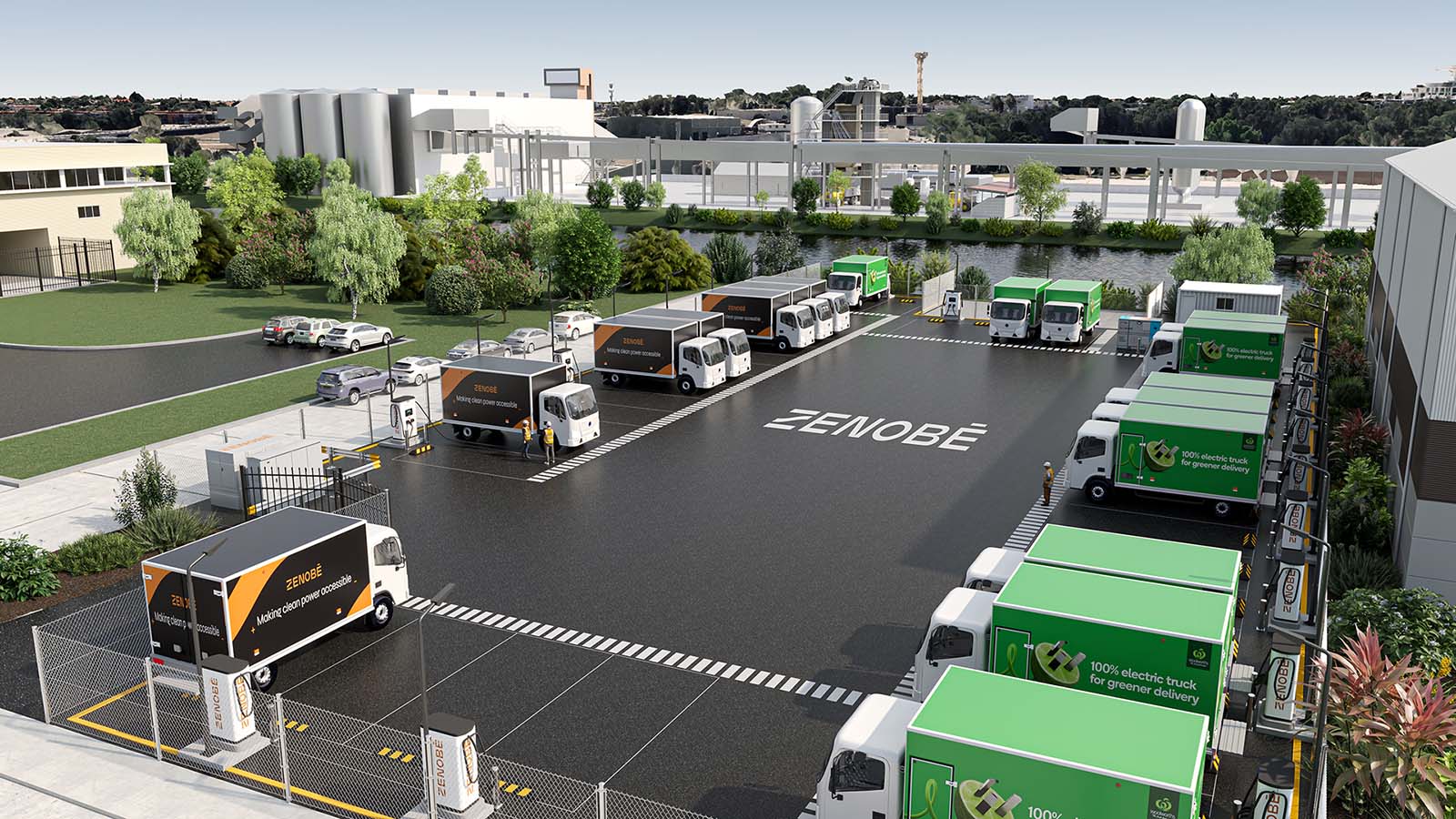Powering through challenging electric fleet projects
The transition to electric fleets is about much more than purchasing new vehicles. From site planning and procurement through to fleet commissioning, there are many steps, and each is an opportunity for a project to go sideways. Here are some stories of real-world electric fleet projects across three continents and industry sectors. Each one spotlights a unique set of challenges that our team of specialists tackled for our customers and helped them overcome.
One is a North American electric school bus project, another is a busy U.K. public transit depot and the third is an Australian delivery truck fleet in the grocery space. From the common to the complex, each project features different customer pain points and solutions drawn from our proven engineering capabilities, battery performance guarantees, access to financing and purpose-built software.
1. Reviving a stalled American electric school bus fleet
As a global Electric Fleet-as-a-Service provider, Zenobē has experience supporting over 2,000 electric vehicles and 120 depots. Each fleet electrification project is unique, so we meet our customers where they are by providing either an end-to-end or a modular solution. Occasionally, we jump in when a project has hit a roadblock and use our experience, relationships and resources to get it back on track.
When an American school district’s electric fleet project stalled despite securing federal and state funding for more than two dozen electric school buses, the Zenobē North America team stepped in to get the project back on track.
The project featured complex site planning and permitting challenges, including flood plain mitigation. The original plan was over-engineered, expensive and not fit for running day-to-day route operations. Zenobē managed to come into the project mid-stream, provide a value engineered design solution that was fit-for-purpose, protected day-to-day route operations and was much more cost efficient.
Zenobē also implemented a flexible, technology-agnostic approach to select and integrate the most suitable charging infrastructure. Zenobē’s flexible, modular approach resulted in a custom solution tailored to the district’s unique needs which avoided unnecessary costs or restrictive technology options.

2. Electrifying a busy, live U.K. transit depot
In the City of Oxford, Zenobē helped Oxford Bus Company deploy 104 electric transit buses and electrify its depot without interrupting daily transit operations—no small feat.
With federal funding secured, Oxford Bus Company needed to transition its fleet quickly and efficiently. Zenobē delivered the infrastructure and battery management expertise to make it happen. By taking a phased approach and collaborating closely with stakeholders, Zenobē was able to redesign the depot and install charging infrastructure, all while the depot remained fully operational. Through a 15-year Battery-as-a-Service agreement, where Zenobē purchased the batteries and leased them back, the bus company reduced its upfront costs and spread the battery costs into manageable monthly payments. This allowed more funds for zero-emission vehicles while reducing operational risk.
“We worked in close partnership with Oxford Bus Company to design and deliver the charging infrastructure that worked for their operations and helped them achieve their decarbonization goals,” said Bradley Fox, Director of EV Fleet at Zenobē. “With the right investment and partners, bus fleet electrification can be achieved at speed and scale.”
By August 2024, 159 fully electric buses were operational in Oxford, contributing to a sustainable public transport system and better air quality for the community.

3. Getting creative with a charging hub for an Australian delivery truck fleet
Woolworths, a major Australian supermarket brand, sought to electrify its home delivery trucks in Sydney but its electric fleet project faced several challenges. Their site wasn’t large enough to accommodate 60 electric trucks or the required charging infrastructure, and its existing power grid connection was insufficient to charge such an electric fleet.
To address Woolworths’ challenges, Zenobē developed plans for an innovative shared off-site charging hub. The facility offers flexible and exclusive access to charging points, not only for Woolworths but also for other businesses in the logistics and fleet industries. Zenobē supplied Woolworths with new electric vehicles under an Electric Vehicle-as-a-Service model, which includes a manageable monthly fee for vehicles and charging services. This approach removed the need for significant upfront investment in the fleet and mitigated the risks associated with battery technology.
“It’s common that projects meet a dead end with their first investigations into electric. There are other ways to do it, and what’s more, we’ve been there before. You can learn from our previous work and get to the answer you need quicker,” said Minett Hedger, Bid & Commercial Manager at Zenobē.
Zenobē provided private financing combined with a federal grant, reducing costs for participating businesses and narrowing the cost gap between diesel and electric trucks. This innovative solution not only solves Woolworths’ challenges but also supports other businesses in the area seeking to electrify their fleets.

Fleet electrification success starts with the right partner
In today’s unpredictable market, it’s vital that fleet managers have the right partner at their side, ideally one who can be counted on for the long term. A strong and long-term relationship with an experienced fleet electrification partner can safeguard your project against uncertainties and ensure that you are set up for success in the transition to electric fleets.
Learn more about our capabilities here. For advice or support with your electric fleet project, connect with our Zenobē North America team via Maggie Clancy, EVP Business Development (Fleet), at maggie.clancy@zenobe.com.
Key factors when selecting an electrification partner
1. End-to-end services with a modular approach
The ideal partner should offer a full suite of services, including procurement, financing, grid integration, infrastructure deployment, battery management, software solutions and long-term maintenance. A modular approach allows fleet operators to select only the services they need, ensuring support is tailored and costs are managed.
2. Financial support and innovative business models
With government funding in flux in the U.S. and extremely competitive in other countries, the right partner will assist with grant applications and provide financing options that lower initial costs. Innovative models such as “Battery-as-a-Service,” or “Electric Vehicle-as-a-Service” can shift operational risk away from fleet operators while improving long-term financial predictability.
3. Proven experience and track record
Finally, look for partners with a strong history of delivering successful electrification projects. Their experience across various regulatory environments and project sizes can bring critical insights and an ability to adapt to changing circumstances.
By choosing a reliable partner with flexible and comprehensive support, fleet managers can navigate uncertainties with confidence and ensure their fleet electrification projects are set up for long-term success.
